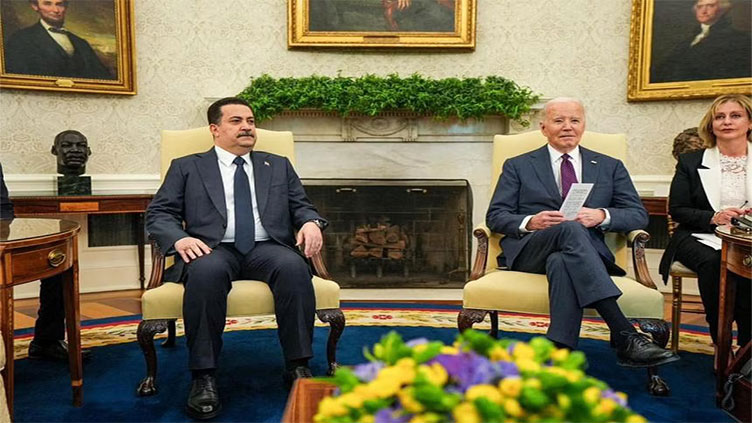Biden says wants to stop Middle East conflict spreading

World
Biden also reiterated his desire for a ceasefire in the war between Israel and Hamas.
WASHINGTON (AFP) – US President Joe Biden said Monday he wants to prevent the Middle East conflict from spreading but vowed to defend Israel after Iran launched an unprecedented aerial attack on the key US ally.
Biden also reiterated his desire for a ceasefire in the war between Israel and Hamas following the October 7 attacks.
"Iran launched an unprecedented aerial attack against Israel, and we launched an unprecedented military effort to defend it. Together with our partners, we defended that attack," Biden said as he met Iraq's prime minister at the White House.
"The United States is committed to Israel's security. We're committed to a ceasefire that will bring the hostages home and prevent the conflict from spreading beyond what it already has," Biden added in the Oval Office.
Biden was referring to those kidnapped by Hamas militants in the October 7 attack.
Israel is weighing its response to Iran's massive drone and missile attack on Saturday, which Tehran said was in retaliation for a presumed Israeli strike on an Iranian consulate building in Syria that killed a top general.
US forces helped Israel take down almost all the projectiles.
Biden has promised "ironclad" support for Israel but also urged it to "think carefully and strategically" before launching a response that could trigger a wider war.
The US president said he was "also committed to the security of our personnel and partners in the region, including Iraq."
'RESTRAINT'
Iraq's Prime Minister Mohamed Shia al-Sudani, visiting for talks on the presence of US troops in Iraq as part of an anti-jihadist coalition, called for "restraint."
"We encourage all the efforts to stop the expansion of the area of conflict, especially the latest development," he said, speaking in Arabic through a translator.
Sudani added that he was "very eager" for an end to the Gaza war.
Iraq has been trying to stay out of regional tensions, even as pro-Iran armed groups in the country have carried out a series of attacks on US facilities since October 7.
The White House meanwhile denied that it had received advance warning of the timing or targets of Iran's attack, which it called a "spectacular" failure.
"I've seen reporting that the Iranians meant to fail, that this spectacular and embarrassing failure was all by design," National Security Council spokesman John Kirby told a briefing.
"I've also seen Iran say that they provided early warning to help Israel prepare its defenses and limit any potential damage. All of this is categorically false."
US officials have previously said that Iran passed a message through Switzerland to Washington saying they intended to respond to the Damascus strike.
US Secretary of State Antony Blinken separately said Washington did not want any escalation.
"What this weekend demonstrated is that Israel did not have to and does not have to defend itself alone when it is the victim of an aggression," Blinken said at the start of a meeting with Iraq's deputy prime minister.
Blinken said he was involved in a flurry of talks over the last 36 hours, seeking to coordinate a diplomatic response that would prevent any escalation of the crisis in the region.


